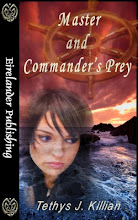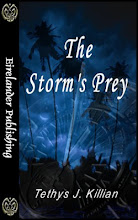T.J. started an important topic 2 days ago about voice. We've all heard about voice, the long and short of it. But what is it basically?
Voice is that special brand of writing unique to an author. It's how you write - whether you use long paragraphs of description that however mingles seamlessly into your story (think Tolkien and Jilly Cooper); whether you ramp up the emotion and describe every little happening in the emotional drive (Marian Keyes and Katherine Garbera); whether you write with humour and wit (think Sophie Kinsella and Jill Mansell and also Janet Evanovich); whether you're known for the unexpected twists and turns you bring to a story (Sidney Sheldon and again, Jill Mansell); whether you write about hard issues in a way that sucks in everyone (Martina Cole). It's something that as a writer passes through your words and makes the way you write unique.
One thing many confuse is voice and genre. Voice transcends genre, for example Philippa Gregory writes both contemporaries and historicals, yet the way she lays out her story and her wording immerses you into the plot irrespective of whether she is writing about small-town England or the Elizabethan era. As a writer, say for example your particular brand is funny and witty. Whether you write a contemporary or a fantasy, your readers who are follwoing you won't bother that you're asking for a suspension of disbelief when in the fantasy world. They want to read you because they want that funny streak.
And that's the mastery of voice. Your voice is how you write. Period. Now if like Sophie Kinsella you write funny contemporaries about modern and slightly silly but endearing characters, you as a reader read Sophie Kinsella because you know there will be that funny tone in her works. Now imagine Ms. Kinsella going way off to another genre - say a paranormal. You expect to see something along the lines of Sabrina The Teenage Witch from her pen, not the Dresden Files of Jim Butcher.
T.J. mentions consistency of voice. It's plain and simply that how you write is supposed to be consistent, unless you expressly want to branch out to another voice (again, think funny v/s dark and dismal), you need to build this new voice, and expect that not everyone will follow and you may also lose readers this way.
Another aspect of voice is what POV you use. If your readers love your 1st person takes, be careful when venturing to 3rd person. It may be easier to switch from 3rd to 1st, but always expect that the reader who reads you in one POV and liked your style may not like the other POV because the two are inherently different.
One other thing - your voice is yours, most definitely, but you have to ask yourself whether this voice agrees with the market of today and the market you are targetting. Anyone who's read a Betty Neels M&B will know what I mean here. Ms. Neels wrote about romance but her stories were more about narration and the day-to-day happenings of the characters. Take a look at any M&B today, and romance in general, and you will see it is action and character-driven. The story is in your face, and you are not supposed to go about how the heroine Marie spent her day first visiting the cats in the loft of the barn, then she whiled away the afternoon with a stroll by the lake and then she came back home as the dark was descending to have a hearty meal of shepherd's pie before going to sleep. This was good when Ms. Neels wrote circa the 70s, but it is not what the market of the post-2000 looks for.
An author who comes to my mind every time I think of mastery of character involvement in Harlequin and Mills and Boon stories is Katherine Garbera. Okay, a Blaze book is only 180 or so pages long, and I can read that in 2 hours. But with Katherine Garbera's books, I do it in just over an hour. Why? Because she sucks me into the story and I feel I'm there in the scenes, and it is oh-so-hard to break away without knowing how the H/h are gonna end up together! This is all thanks to her voice, because a Blaze is always a Blaze with H/h kept apart yet with a fire burning between them. You know they'll overcome all obstacles and get that HEA, yet why is it some other Blazes you can put down at page 60 and then pick up to get to 100, and then to 120, and so on, while for some you simply have to read it all in one go?
Voice, again, is the key.
I hope I didn't further muddy the waters for you. Any questions, feel free to holler!
By the way, come check my new website - it just went fully live this week!
Aasiyah Qamar - Cultural Romantic Fiction, With a Twist
Coming out October 2 - Light My World - Eirelander Publishing
Nolwynn Ardennes - The Promise of Fulfilment
Coming out in January 8, 2010 - Storms in a Shot Glass - Eirelander Publishing
Aasiyah Qamar/Nolwynn Ardennes - Romance the world over
www.aasiyah-nolwynn.webs.com
Thursday, June 4, 2009
Voice sotto voce
Subscribe to:
Post Comments (Atom)





.jpg)
.jpg)






4 comments:
I believe the author's voice is what keeps readers buying their books. Recently I read an article about voice that said as writers we are drawn to authors with a voice similar to our own, even if we haven't yet learned how to perfect that voice. When we read their work, something about it resonates with the thoughts, ideas, and language we have in common.
Last year I "discovered" J.R. Ward and Suzanne Brockmann and can't get enough of their writing. What's interesting to me is that Brockmann is on Ward's executive committee. Ward obviously loves Brockmann's voice, and even though they write in different sub-genres, their style is similar. Does that make sense?
Another great post, Z. I think voice is important to have, but to beginning writers it's very elusive.
Voice is the author, but just saying that is not easily understood. Maybe, it has to do with the environment we grow up in.
Hey Chicki
Yes, it makes sense. I know I am drawn to Katherine Garbera and Marian Keyes because they write about emotions and character involvement, which is basically how I go about penning my novels too. It can be that their voice follows the same thought process I as writer engage in when I devise a story.
This also falls into the line of 2 writers cross-promoting one another. What makes you want to promote one writer more than another? It may be that their voice resonates with you, and you feel a kindred with their style, subconsciously recognizing that you engage with them and their voice.
Thanks for bringing up those very good points!
Hugs
Z(Aasiyah/Nolwynn)
Hey Sandy
Yes, voice is an elusive thing. It takes a lot of writing across different genres and POVs to figure out what flows better from your pen. Many a times, a writer finds himself/herself blocking on a certain story. The issue may not be writer's block as much as it's the fact that the voice they're trying to put through is not inherently theirs. I say this from experience - when I tried writing omniscient the likes of many authors I've read and appreciated, the work resembled a mishmash of interaction that would make anyone dizzy. It simply did not allow me the focus my voice needs, which I found in limited 3rd person.
Yes, it could be the environment, but it could also be your character and personality that shines through. A man's voice will probably be action-driven with very little emotion, like in the case of Sidney Sheldon. But a woman will give more attention to emotion even in an action-packed work, such as is the case with Martina Cole.
Thanks for the comment. It's making us all think, and that's great!
Hugs
Z(Aasiyah/Nolwynn)
Post a Comment